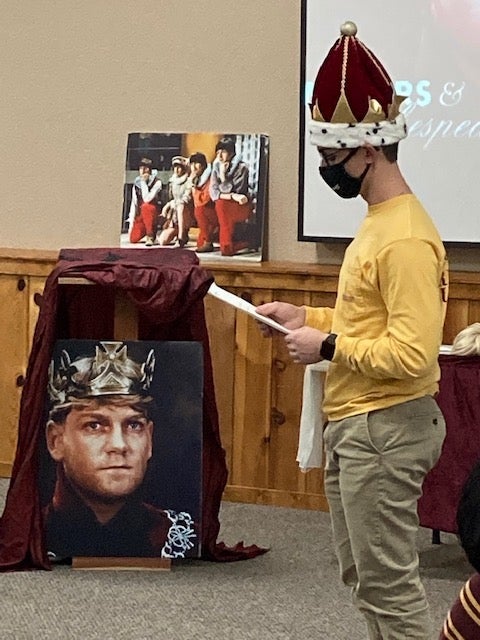Shakespeare in the pines

Each day, students had time to enjoy the beauty of Prescott.
Over winter break, a small group of Arizona State University students and two professors traveled to Prescott, Arizona, for a week of reading, discussing and performing Shakespeare.
Held annually by the School of Civic and Economic Thought and Leadership, Shakespeare's Leadership Lessons: Performance and Politics in the Pines is a three-credit course that explores the theory and practice of leadership and statesmanship through "Henry V," "Macbeth" and "The Tempest."
Like almost everything else in 2020, this year’s course was affected by COVID-19. Originally planned for August in a pre-fall semester course, this year’s program was moved to early December. Students were required to follow strict physical distancing and face-covering protocols, fill out a COVID-19 disclosure form, receive a negative test before attending and agree to 13 on-site expectations, said Susan Carrese, clinical assistant professor for the School of Civic and Economic Thought and Leadership.
“This course is intentionally subtitled ‘Performance and Politics in the Pines’ — it is experiential by design,” said Carrese, who has taught the program for the past three years. “We knew it was essential to keep the in-person pedagogy that allows performance and the place-based, classroom-without-walls of Pinerock Camp in Prescott, even in the midst of the pandemic. With extensive planning, student cooperation and careful risk management in collaboration with the Study Abroad Office, we were able to safely run this unique program.”
“The masks and social distancing of course made interaction and communication more complicated, but we adjusted,” said Angel Orozco, a global politics major. “The regulations in place to maintain everyone's health were fairly strict but manageable. All it took was a little more projection when speaking to ensure everyone can hear.”
This year’s course was held at Pinerock Retreat Center in Prescott. Normally the center holds over 250 students but with help from Mandy Nydegger and Dan Hart at ASU’s Study Abroad Office, the course’s cohort had the place to themselves.
During the week, the students read and discussed one of three Shakespeare plays during the day and spent evenings with presentations of leadership lessons or films that supported the understanding of the plays. Each day the students had time to enjoy the natural beauty of Prescott through early morning walks, yoga practice, afternoon hikes or time spent by the outdoor firepit.
Students are provided with costumes and props during the Movers and Shakespeares workshop.
“I greatly enjoyed our discussions about 'Macbeth,' both because it was the first time I read the play, and because of the quality of the discussion,” said Parker Faries, a civic and economic thought and leadership major. “On a more personal note, I also enjoyed the short hikes I took with several other students, where we discussed the texts and other philosophical or political ponderings of our own.”
The final days of the course culminated in a Movers and Shakespeares workshop, which was directed by Carol Adelman and Ambassador Ken Adelman.
"Perhaps Shakespeare's leadership lessons resonated even more this year for (School of Civic and Economic Thought and Leadership) students, who find themselves caught up in the chance occurrence of a pandemic, which has rocked their lives and changed their university experience, because the spirit of Shakespeare infused their conversations, their writing and the new intellectual friendships they forged during the workshop in a way that seemed to prove the eternal importance and relevance of learning from Shakespeare more than ever," said Carol McNamara, associate director for public programs and senior lecturer in the school.
“The best part of the experience for me was the direct application to my own life,” Orozco said. "The purpose of the course wasn't just to read and understand a play but to draw out the lessons and apply them to my own life. To become a better person and leader by learning and reflecting on who I am and who I want to be.”
By week’s end, the cohort, which carefully studied "Henry V’s" famous motivational St. Crispin’s Day speech on the eve of the battle of Agincourt, had indeed, become “we few, we happy few, we band of brothers” (Act IV, Scene III) — with connections and experiences to carry them through hard times.
More Law, journalism and politics

A new twist on fantasy sports brought on by ASU ties
A new fantasy sports gaming app is taking traditional fantasy sports and mixing them with a strategic, territory-based twist.…

'Politics Beyond the Aisle' series to explore the stories of public officials
In an effort to build a stronger connection between students and political and civic leaders, Arizona State University’s School…

ASU committed to advancing free speech
A core pillar of democracy and our concept as a nation has always been freedom — that includes freedom of speech. But what does…


